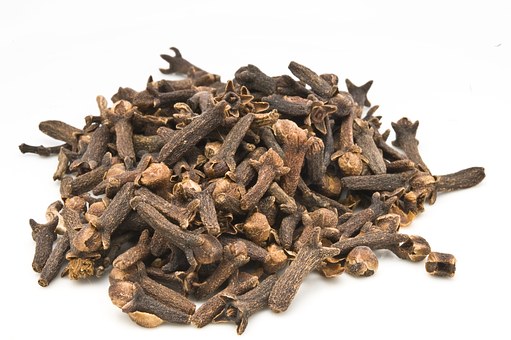You’re probably familiar with clove, an aromatic spice that is commonly used in Indian and Chinese culture as seasoning and for medicinal purposes. Cloves, also known as clove buds, gained popularity all over the world, especially in the western hemisphere, during the 7th century because of their health benefits.
Like other spices, cloves can also be used to make an essential oil. While it is not as popular as other plant oils, I believe there are numerous reasons why you should consider having clove bud oil at home.
What Is Clove Bud Oil?
Clove bud oil is derived from the clove tree, a member of the Myrtaceae family. This tree is native to Southeast Asian countries like Indonesia. From the evergreen, you can derive three types of clove essential oils: clove bud oil, clove leaf oil and clove stem oil.
Out of the three, clove bud essential oil — also known as Eugenia carophyllata — is the most popular in aromatherapy. Because the oils produced from the leaves and stems have stronger chemical compositions than the buds, they can easily cause skin irritations, which makes them unfit for aromatherapy.1
During the time of ancient Greeks and Romans, this plant oil was used to relieve toothaches and to combat bad breath.2 Its presence was also found in Chinese and Ayurvedic medicine with the same purpose.
Today, clove bud oil is known for its benefits to oral health. This essential oil, which has been approved as a dental anesthetic mouthwash and gargle, can help relieve toothaches, as well as help fight mouth and throat infections. It is also added to pharmaceutical and dental products.
Uses of Clove Bud Oil
The oil of clove buds is known for its antimicrobial, antifungal, antiseptic, antiviral, aphrodisiac and stimulant properties.3 Apart from its positive effects in the field of dental care, it can also be used as a treatment for minor health concerns. Below are some of the most common uses of this plant oil:4,5,6
| ✓ Digestive aid — Cloves possess beneficial properties that help relax the smooth muscle lining in your gastrointestinal tract. When used as an oil, it can aid in halting digestive problems, like nausea and vomiting. |
| ✓ Skin care product — When applied topically, clove buds can help address skin problems like warts, acne, sagging skin and wrinkles. |
| ✓ Insect repellent — When used together with citrus essential oils, this plant oil can help ward insects away. |
| ✓ Expectorant — Clove bud oil is also used to help ease respiratory problems, such as cough, colds, sinusitis, asthma and tuberculosis. In fact, chewing on a clove bud is said to help sore throats. |
| ✓ Antiseptic — It is applied topically to assist in addressing fungal infections, wounds and cuts. It is also a common treatment for athlete’s foot. |
| ✓ Perfume ingredient — Bud oil, with its strong and unique scent, is used in carnation, rose and honeysuckle perfumes. It has a strong and unique scent. |
| ✓ Flavoring agent — This is because of the oil’s unique flavor and aroma. |
| ✓ Soap ingredient — Clove bud oil is used in soaps not just for its fragrance, but also because of its relaxing and antiseptic qualities. |
| ✓ Massage oil — It can be used to relieve pain and stress. |
Composition of Clove Bud Oil
The predominant chemical constituents found in all three types of clove oils are eugenol, eugenyl acetate and caryophyllene. However, these three types all vary in their eugenol content.
For instance, clove leaf oil contains very low levels of eugenol, compared to clove bud oil. Oil derived from the clove stem contains the highest amount of the compound, which makes it unsuitable for external applications.
Benefits of Clove Bud Oil
Clove oil owes much of its health benefits to eugenol,7 which make up to 90 percent of the oil. This compound provides potent antiseptic and anti-inflammatory benefits and is also responsible for preventing cloves from spoiling.
Thanks to this chemical compound, this plant oil is very effective against dental pain, sore gums, mouth ulcers, cavities and bad breath.
It is because of the compound that clove oil, as well as other spice oils that contain eugenol (like cinnamon, basil and nutmeg oils), are added to dental products, insect repellents, perfumes, foods and even pharmaceutical products.
Eugenol also causes clove oil to have stimulating and warming properties, which make it a popular choice among aromatherapy practitioners. Part of its list of benefits is its ability to aid in stimulating your metabolism by helping improve your blood circulation and lowering your body temperature.
It can also contribute to your digestive health and help address problems like hiccups, indigestion, motion sickness and excess gas.
Apart from helping support your metabolism, clove bud oil can also help relieve stress and help lessen mental exhaustion. Some use it to tackle neural health problems, such as depression and anxiety. The oil can also work as an aphrodisiac and treatment for insomnia.
How to Make Clove Bud Oil
Clove bud essential oil, including the other two forms of clove oil, is produced by steam distillation. However, you can also extract oil from clove buds at home. Here’s an easy-to-follow guide from eHow.com:8
What You’ll Need
- 4 fresh clove buds, crushed
- 600 ML airtight bottleneck jar
- Carrier oil, such as olive oil
- Strainer
- Glass container with spout
Procedure:
- Take the airtight jar and place the four crushed cloves at the bottom. Crush them thoroughly so that they can fit into the container.
- Fill the jar with the carrier oil until the cloves are submerged, but not too much to overfill the container.
- Seal the container tightly. Exposure to air can affect the oil’s potency.
- Set aside the mixture for a week in an area where it can be exposed to sunlight.
- Transfer the mixture into the glass container with a spout. Use the strainer to remove any sediment. Do not hesitate to strain the oil a couple of times to make sure particles are completely removed.
- Dispose of the cloves from the strainer and do not reuse these cloves, as doing so can impact the effectiveness of the oil.
- The strained mixture should be poured back to the airtight bottleneck container.
- When storing, make sure the oil is sealed tight. Shelf life can last from four to five years. Color may darken as time progresses.
Notes:
- If the clove buds are not fresh, add two more buds.
- The longer the cloves are submerged in the oil, the more potent the oil will be.
- If the cloves stay in the oil for over a month, add more oil before straining.
How Does Clove Bud Oil Work?
Clove bud oil is meant to be applied topically. When mixed with other oils like coconut oil and olive oil, it can function as a massage oil. To help treat respiratory illnesses, clove oil can be used in steam inhalation. It may also be mixed in skin care products to enhance their benefits. Here are some specific ways on how to use this plant oil:9
| ✓ Mix two drops with a carrier oil and massage onto your abdomen to assist in relieving digestive discomfort. You may also add three to five drops in lukewarm bath water to help address bowel issues. |
| ✓ Use two drops of clove bud oil in steam inhalation to aid in relieving mucous and loosen phlegm. You may also add two drops to your decongesting ointment or gel and rub onto your chest, back and throat. |
| ✓ Add two drops of clove oil to your skin care products or 1 milliliter of jojoba oil. This can help hasten the healing of wounds, cuts, bruises and even athlete’s foot. |
| ✓ Massage three drops of clove oil with 2 milliliters of carrier oil to experience the oil’s painkilling action. |
| ✓ Add one drop of diluted clove oil onto a small cotton ball to relieve tooth or gum pain. Press the cotton ball onto the affected area for 10 to 15 minutes. You may also add two drops of clove bud oil to a cup of warm water and use this as a gargle. |
| ✓ Two drops of clove bud plant oil used in a diffuser or vaporizer can ward off insects. Blending two to three drops to your skin care product can also produce an insect repellent. |
I advise you to practice extra caution if you decide to try clove bud oil internally, as too much can cause certain side effects (see section on side effects below). I recommend using clove bud oil, or any essential oil for that matter, under the supervision of an experienced aromatherapy practitioner.
Is Clove Bud Oil Safe?
Using this oil undiluted can lead to serious skin problems. To prevent this from happening, I suggest you dilute clove bud oil with a carrier oil such as jojoba oil, coconut oil or olive oil. If you’d like to apply it topically, check first for allergic reactions. Perform a skin test or apply a drop on your skin and observe for any side effects.
Clove bud oil, as well as the other forms, is considered a dangerous sensitizer in some individuals. High concentrations of eugenol may irritate your mucous membrane and may cause dermatitis and other skin problems. It should never be used on damaged skin. In some cases, the oil may lead to photosensitivity. For instance, exposure to sunlight after the application of unadulterated clove bud oil can lead to severe burns or the spread of viral sores.
People using anticoagulants and aspirin should avoid clove oils as they can slow down platelet activity. The oil can also cause blood glucose to plummet, so diabetics should be extra careful when using it. Individuals with liver or kidney disease should also refrain from using this oil because it can cause damage to both organs.
Pregnant and nursing women should use caution when using clove bud oil. Children should be kept away from this oil because of potential intestinal discomfort. It is best to steer clear of any clove product if you are allergic.
Side Effects of Clove Bud Oil
Despite its many health benefits, I advise everyone, especially beginners, to use clove oil in moderation. Eugenol, while it offers many beneficial properties, may induce allergic effects. It should be taken gradually in small amounts. For instance, taking the oil orally in its undiluted form can result in nausea, vomiting, sore throat, seizure and even blood problems. It may lead to shortness of breath, even rashes and itching.10
Repeated use of clove bud oil to address acne problems can cause skin damage, which may leave permanent marks.11 If you’re thinking of using clove bud oil to address a dental problem or any health concern, I recommend that you seek the advice of a holistic healthcare practitioner or an experienced aromatherapist first.
Sources and References
- 1 eNatural Healing, December 17, 2012
- 2 Oils and Plants, Clove Bud
- 3 Experience-Essential-Oils.com, Clove Oil Uses are Amazing
- 4 Healing Naturally by Bee, Cloves & Clove Oil
- 5 OrganicFacts.net, Health Benefits of Clove Oil
- 6 Maria Lis-Balchin, Aromatherapy Science: A Guide for Healthcare Professionals, p.171
- 7 Mother Earth Living, June 1997
- 8 eHow.com, Homemade Clove Oil
- 9 Ayurvedic Oils, January 5, 2014
- 10 eHow.com, What Are the Dangers of Ingesting Clove Oil?
- 11 Diet Health Club, Clove Health Benefits








